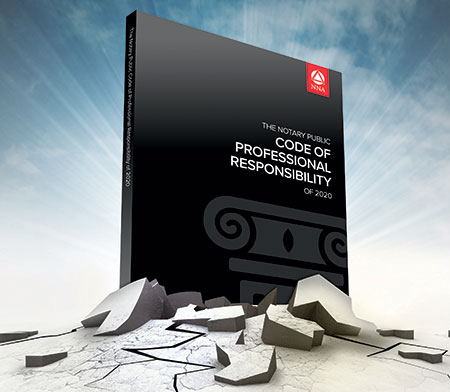
A few years ago, there was a lawsuit involving a Notary who performed notarizations at work. The owner of a property whose signature appeared on a deed was not present before the Notary to have his signature notarized on the deed. Later, when the owner learned the property had been sold, he sued.
We don’t know exactly what happened that day. The Notary testified the seal on the deed was his, but the Notary’s signature was not. Thus, the court said two explanations were possible: either the Notary didn’t properly identify the person presenting the deed for notarization, or the Notary didn’t properly secure his seal. Either way, the Notary committed an act of misconduct.
Since we really don’t know what went down that day, we’ll focus on the journal in this particular notarization because the evidence tells an interesting story. The journal is the subject of The Notary Public Code of Professional Responsibility of 2020’s Guiding Principle VII, which reads, “The Notary shall record every notarial act in a bound paper or secure electronic journal and safeguard it as an important public record.”
Here’s what we know about the Notary journal in this case. The Notary kept a journal (referred to as a “logbook” in the court opinion). The journal was kept at the retail shop in an unlocked drawer that was accessible to anyone who worked in the store. When the Notary left employment, he left the journal with his former employer. The employer destroyed the journal because it was not available at trial. Finally, we know that just under ten years had elapsed between the date of the notarization and the commencement of the trial involving the improper notarization.
We’ll credit the Notary for adhering to Code Standard VII-A-1 by keeping a journal. Aside from that, this Notary did everything else wrong with respect to the journal. The Notary did not protect the journal. Standard VII-B-1 requires the journal to be safeguarded. By keeping the journal in an unlocked drawer, we don’t know who could have accessed — and potentially altered — the journal entry in question or ultimately who destroyed the journal, as happened in this case.
Next, the Notary violated Standard VII-B-2 by surrendering the journal to his employer when he left employment.
Finally, the Notary violated Standard VII-B-3 which requires the journal to be retained for ten years in the absence of any state rules specifying a different period of disposition. Why require a Notary to keep the journal for ten years? Since most lawsuits occur years after a contested notarization is performed, Standard VII-B-3 ensures that the important evidence in a Notary journal is available at trial and that a Notary who testifies at trial — like the Notary in this case — can remember just what happened years earlier when the document was notarized. Here, the time between the notarization and start of trial was just under ten years. Had the Notary followed the Code, the journal would have been available to sort out what happened on that eventful day.
The Code’s journal standards are links in a chain protecting a valuable public record. The links include keeping a journal, safeguarding the journal, and retaining the journal. Break a link in the chain, and the value of a journal is destroyed, as it was in this case.
Bill Anderson is the NNA’s Vice President of Government Affairs and Drafting Coordinator for The Notary Public Code of Professional Responsibility of 2020.